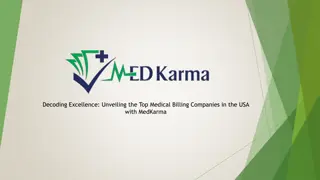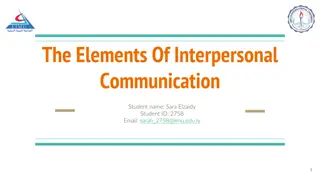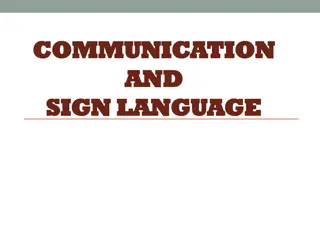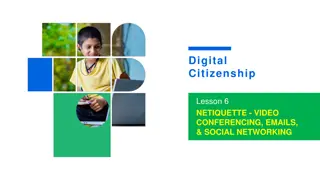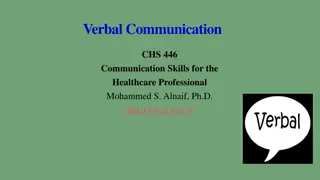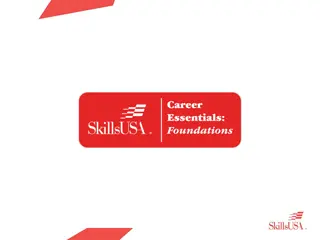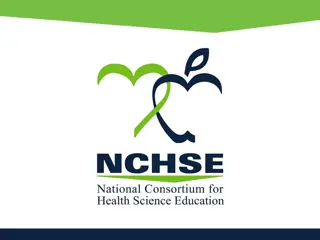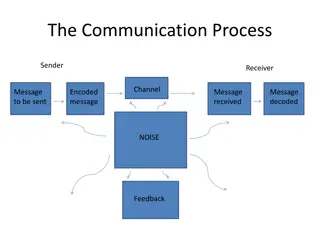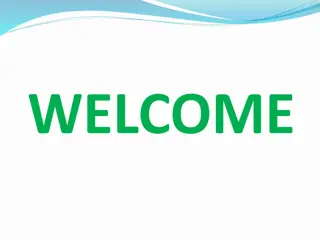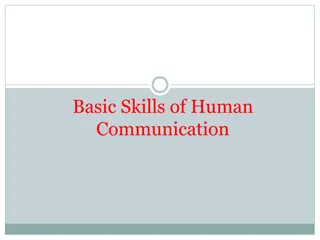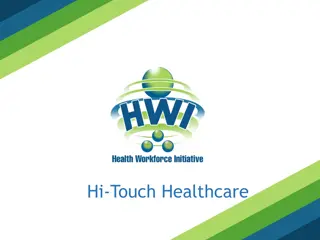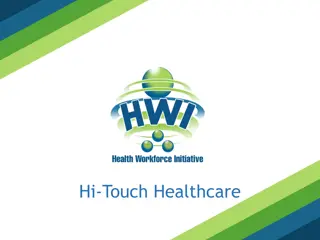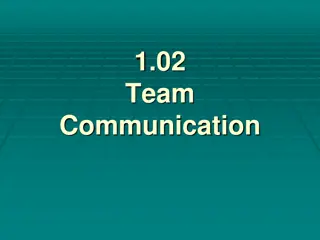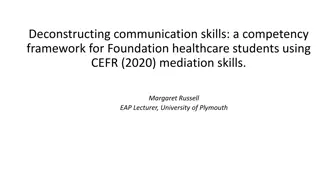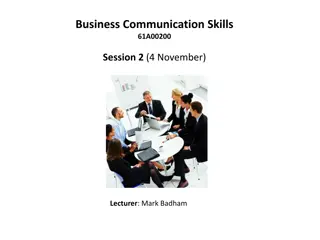Mastering Effective Communication Skills in Healthcare
Explore the importance of effective communication in healthcare, including verbal and non-verbal communication types such as spoken, written, tone of voice, vocabulary, gestures, touch, and body language. Learn how good communication skills enhance patient care and relationships in the healthcare setting.
Download Presentation

Please find below an Image/Link to download the presentation.
The content on the website is provided AS IS for your information and personal use only. It may not be sold, licensed, or shared on other websites without obtaining consent from the author.If you encounter any issues during the download, it is possible that the publisher has removed the file from their server.
You are allowed to download the files provided on this website for personal or commercial use, subject to the condition that they are used lawfully. All files are the property of their respective owners.
The content on the website is provided AS IS for your information and personal use only. It may not be sold, licensed, or shared on other websites without obtaining consent from the author.
E N D
Presentation Transcript
1.02 Understand effective communication
Journal Prompt #1 How do you communicate? Do you like to talk? Are you a good listener? What makes you a good listener? Why do healthcare professionals have to have good communication skills? 1.02 Understand effective communication 2
Types of Communication: Verbal and Non-Verbal Verbal Communication Non- Verbal 1.02 Understand effective communication 3
Types of Communication: Verbal and Non-Verbal Verbal Spoken/Oral Communication Non- Verbal 1.02 Understand effective communication 4
Types of Communication: Verbal and Non-Verbal Verbal Spoken/Oral Written Communication Non- Verbal 1.02 Understand effective communication 5
Types of Communication: Verbal and Non-Verbal Verbal Spoken/Oral Written Tone of voice Communication Non- Verbal 1.02 Understand effective communication 6
Types of Communication: Verbal and Non-Verbal Verbal Spoken/Oral Written Tone of voice Vocabulary Communication Non- Verbal 1.02 Understand effective communication 7
Types of Communication: Verbal and Non-Verbal Verbal Spoken/Oral Written Tone of voice Vocabulary Communication Gestures Non- Verbal 1.02 Understand effective communication 8
Types of Communication: Verbal and Non-Verbal Verbal Spoken/Oral Written Tone of voice Vocabulary Communication Gestures Touch Non- Verbal 1.02 Understand effective communication 9
Types of Communication: Verbal and Non-Verbal Verbal Spoken/Oral Written Tone of voice Vocabulary Communication Gestures Touch Non- Verbal Body Language 1.02 Understand effective communication 10
Types of Communication: Verbal and Non-Verbal Verbal Spoken/Oral Written Tone of voice Vocabulary Communication Gestures Facial expressions Touch Non- Verbal Body Language 1.02 Understand effective communication 11
Types of Communication: Verbal and Non-Verbal Verbal Spoken/Oral Written Tone of voice Vocabulary Communication Gestures Facial expressions Touch Non- Verbal Eye Contact Body Language 1.02 Understand effective communication 12
The Communication Model 1.02 Understand effective communication 13
The Communication Model Sender 1.02 Understand effective communication 14
The Communication Model Sender Message 1.02 Understand effective communication 15
The Communication Model Sender Receiver Message 1.02 Understand effective communication 16
The Communication Model Sender Receiver Message Feedback 1.02 Understand effective communication 17
Communication Process Engagement Understanding Education Sense of Partnership 1.02 Understand effective communication 18
Communication Process Engagement Connection between the healthcare professional and the patient Develops partnership 1.02 Understand effective communication 19
Communication Process Engagement: Effective Communication Strategies Introduce yourself Allow the patient to talk without interruption 1.02 Understand effective communication 20
Communication Process Understanding Healthcare professional makes the patient feel accepted Healthcare professional empathizes with the patient 1.02 Understand effective communication 21
Communication Process Understanding: Effective Communication Strategies Allow patient to share thoughts and feelings Share anecdotes to create a bond 22 1.02 Understand effective communication
Communication Process Education To increase the patient s knowledge of their illness Minimizes anxiety 1.02 Understand effective communication 23
Communication Process Education: Effective Communication Strategies Use language the patient understands Make sure all patient s questions are addressed 24 1.02 Understand effective communication
Communication Process Sense of Partnership Healthcare professional and patient work together regarding their problem and treatment plan 25 1.02 Understand effective communication
Communication Process Sense of Partnership Effective Communication Strategies Avoid critical questioning Use active listening 1.02 Understand effective communication 26
Communication Process Active Listening Need good listening skills Show interest Pay attention Hear the message Do not interrupt 1.02 Understand effective communication 27
Communication Process Active Listening Reflection Restatement Clarification 1.02 Understand effective communication 28
Communication Process Active Listening Reflection Careful thought Restatement Rewording Summarizing Clarification Explaining 1.02 Understand effective communication 29




